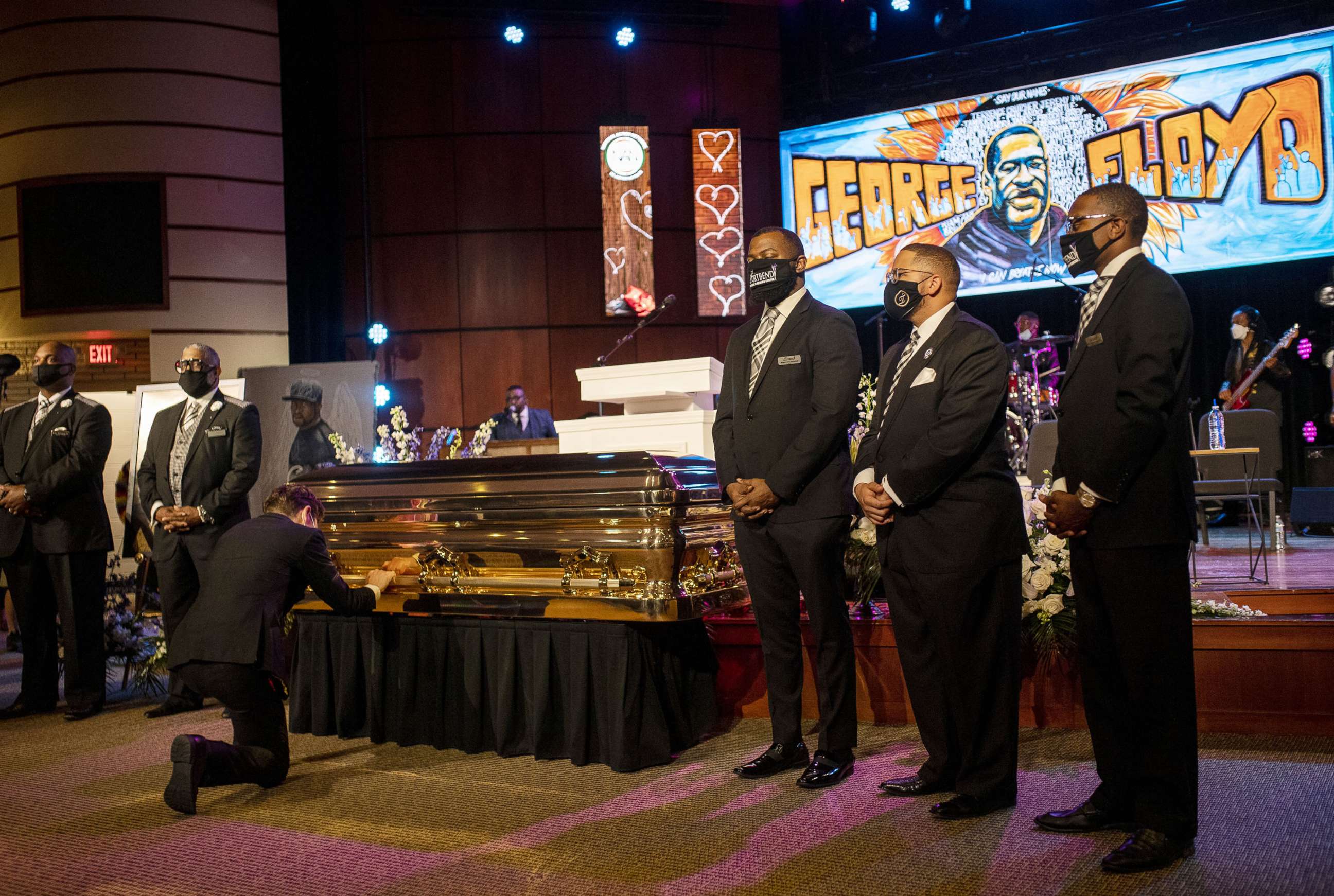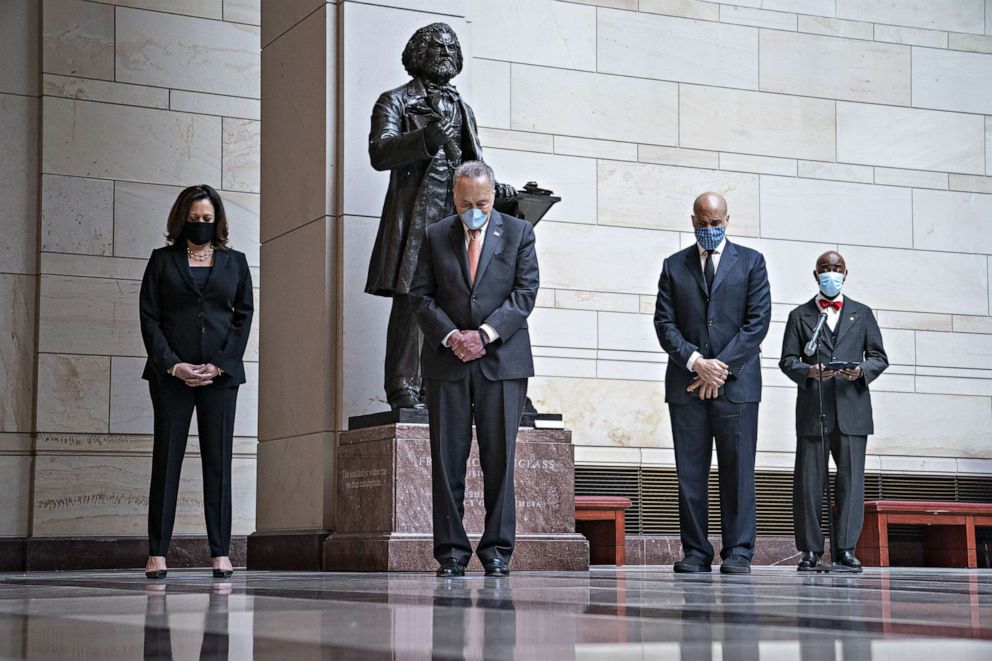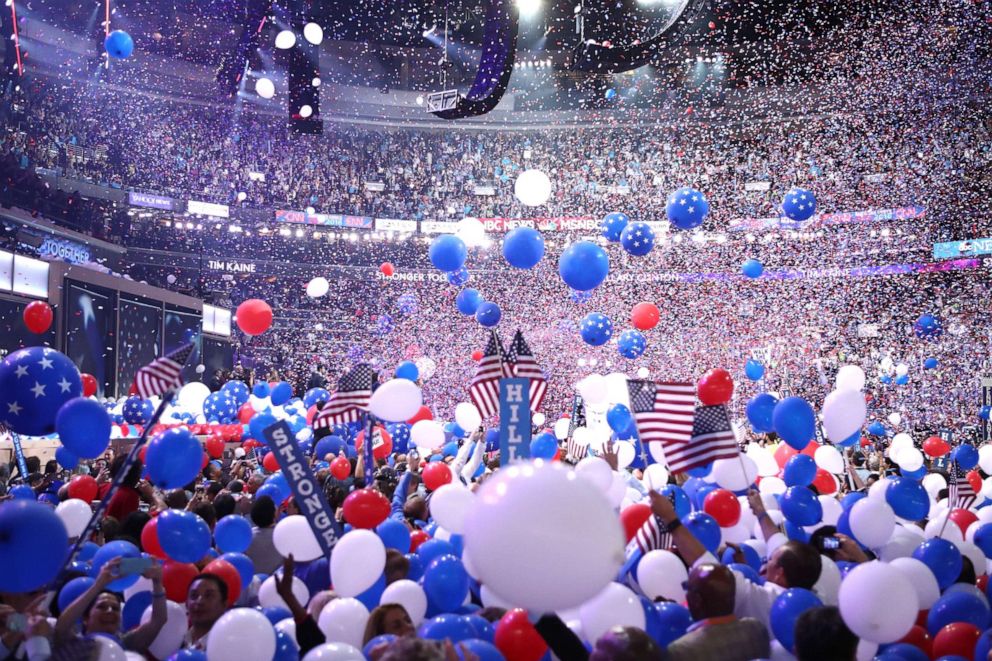The Note: Trump looks to move on from crises as nation mourns
All week the country has battled two emergencies.
The TAKE with MaryAlice Parks
President Donald Trump's reelection campaign ended the week looking to turn a page on one crisis -- the coronavirus -- while the rest of the country slowed down and grappled with another crisis generations in the making.
ABC News reported Thursday the Trump campaign and Republican National Committee were hoping to resume in-person campaigning next week for the first time since the COVID-19 pandemic led to wide-scale social distancing and a ban on group events.
The news came just a day after the president said that Republicans were looking to find a new state to host their party's national convention this summer. Citing ongoing health concerns, North Carolina's governor would not give reassurances that a full-scale event would be possible in August, with nearly 20,000 people inside one arena, without social distancing, as the president has imagined and demanded.

The president's hurriedness was juxtaposed with Rev. Al Sharpton asking for quiet -- calling for 8 minutes and 46 seconds of silence during George Floyd's memorial service. The powerful moment on the national stage allowed for an honest acknowledgment and opportunity to grieve for the same length of time police officer Derek Chauvin allegedly had his knee on Floyd neck.
From consumer brands to social media posts, there has been reflective conversations these last few days on race, discrimination, history and the country’s legacy. Trump has been noticeably absent.
Americans – especially white Americans -- have been wrestling and reckoning with ideas of privilege, lived experiences, and their varied day-to-day relationship with law enforcement. To put a finer point on it, Congress this week again debated a bill to make lynching a federal crime. After nearly 200 attempts, it is still not.
The country this week faced trauma, anger, but also, in many corners, new understanding and purpose.
The RUNDOWN with Alisa Wiersema
As the week comes to a close in the nation's capital, Monday's images of peaceful protesters scattering amid police expansion near the White House continue to loom over any prospects of political unity.
Attorney General William Barr -- who ordered protesters to be cleared from Lafayette Park before Trump's visit to St. John's Church -- insisted to ABC News' Pierre Thomas on Thursday that officials on the ground had identified "instigators" who were throwing projectiles and otherwise making the perimeter an unsafe area.
Barr also said that he didn't know the president was going to walk to the church "until later in the day" after "plans were well underway to move the perimeter."

"There was no correlation between our tactical plan and moving the perimeter out by one block, and the president's going over to the church," the attorney general said at a news conference.
Barr's involvement in the controversy is now being met with challenges from lawmakers and organizations alike, ensuring that the fallout from Monday night's events will continue for weeks, if not months, to come.
Earlier in the week, Sen. Elizabeth Warren called for Barr's resignation, and said she is seeking for the Office of the Inspector General to investigate Barr's role in Monday night's events. Following the attorney general's comments about "no correlation" existing in the sequence of events that transpired, Sen. Kamala Harris, D-Calif., called for the Senate Judiciary Committee to investigate his involvement in the public crackdown.
There's also immediate legal action involved, as the American Civil Liberties Union filed a lawsuit on behalf of the protesters against Trump and Defense Secretary Mark Esper, along with Barr, for allegedly violating their constitutional rights by violently clearing the area.
The TIP with Kendall Karson
The GOP's decision to potentially split their convention between two cities -- by keeping official business in Charlotte, North Carolina, and moving Trump's acceptance speech and a bustling in-person event elsewhere -- has spurred Democrats to take a new public posture.
Democratic National Committee Chair Tom Perez now appears to be signaling they might have some portion of their convention in-person in Milwaukee -- one month after the national party paved the way for remote voting.

"We will follow the science. We've given our convention team the flexibility to understand what the situation is on the ground," Perez said in an interview with SiriusXM's "The Joe Madison Show" on Thursday. "We're not going to put the people of Milwaukee, or our delegates, in harm's way. It's not an either-or -- you either have a full convention or you have a virtual convention. There are gradations in between."
With less than three months until the two gatherings -- with Democrats first up during the week of Aug. 17 and Republicans the week after -- pressure is mounting to make a final decision in the next month. For Democrats, though, a test run is already underway. The Texas Democratic Party is in the middle of their all-virtual state convention, the largest state gathering so far. National Democrats, from House Speaker Nancy Pelosi to presumptive Democratic nominee Joe Biden, are expected to be headliners over the next two days -- providing the party with an early preview of the virtual format.
ONE MORE THING
A new ABC News/Ipsos poll finds that nearly three-fourths of Americans view the death of George Floyd as a sign of an underlying racial justice problem, a shift from a similar question asked six years ago.
BRINGING AMERICA BACK
In a survey of 780 colleges from the Chronicle of Higher Education, 67% are planning for in-person classes this fall, 6% online and 7% both. One thing is for sure: University leaders will need to be flexible. Read this story and more by checking out Bringing America Back, an ABC News feature that highlights the day's top stories in economic recovery and medical preparedness amid the coronavirus pandemic.
THE PLAYLIST
ABC News' "Start Here" podcast. Friday morning's episode features ABC News' Linsey Davis, who joins us from Minneapolis to tell us about the memorial held yesterday for George Floyd. Then, FiveThirtyEight senior science writer Maggie Koerth explains how police escalation of force is playing into these protests. Also, ABC News Chief Business and Economics correspondent Rebecca Jarvis previews what could be another historic unemployment report. http://apple.co/2HPocUL
The FiveThirtyEight Politics Podcast. It's easy to compare today's anti-police-violence protests to the protests of the 1960s, but those comparisons don't paint a full picture. In this installment of the FiveThirtyEight Politics podcast, history professor Yohuru Williams joins Perry Bacon Jr. and Galen Druke to discuss which parallels are apt, how today's protests are different, and what that says about where the movement is headed. https://53eig.ht/2BA7XZi
WHAT YOU NEED TO KNOW THIS WEEKEND
Download the ABC News app and select "The Note" as an item of interest to receive the day's sharpest political analysis.
The Note is a daily ABC News feature that highlights the day's top stories in politics. Please check back Monday for the latest.



